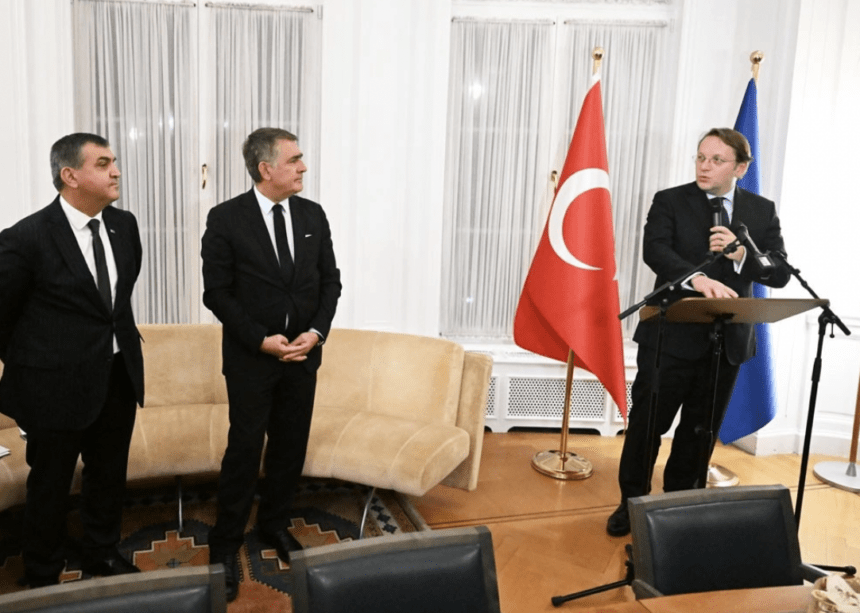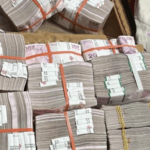European Union (EU) Commissioner for Enlargement Oliver Varhelyi said that Turkish companies are an integral part of EU value chains and have become very strong competitors in the European market.
“Turkey is a candidate country and a key partner of the EU. Turkey is an important NATO ally and a strategic partner in a difficult region. We may not agree on everything, but there are more things that unite us than divide us” Varhelyi said.
Varhelyi spoke at the event “Global challenges, the European Union and Turkey: The role of business” organized by Ambassador Faruk Kaymakcı, Turkey’s Permanent Representative to the EU, and Orhan Turan, President of the Turkish Industrialists’ and Businessmen’s Association (TÜSİAD) at the TÜSİAD headquarters in Brussels to mark the 100th anniversary of the Republic.
“We have trade and investment ties that create jobs and strengthen the real economy,” Varhelyi said at the event, recalling the close contact between the EU and Turkey in terms of tourists, students and business people. Varhelyi pointed out that he has been working tirelessly to improve EU-Turkey relations since he took office at the EU Commission in 2019. Stating that the Customs Union has led to a huge increase in trade and investments despite the challenging global economic environment, Varhelyi reminded that Turkey is the EU’s 7th largest trading partner and the EU is Turkey’s largest trading partner.
Bilateral trade reaches a new dimension
“Last year, bilateral trade between the EU and Turkey reached a new dimension with almost 200 billion euros,” Varhelyi said, recalling that bilateral trade has increased exponentially with the Customs Union. Pointing out that Turkish businesses have full access to the EU internal market, which offers great opportunities, Varhelyi said, “Turkish companies have become an integral part of European value chains and very strong competitors in our market.” Varhelyi reminded that he visited Turkey 5 times during his tenure and said, “We still have a lot of work to do. We are interacting more than ever. We may not agree on everything, but there are more things that unite us than divide us.” Explaining that in the current geopolitical environment, it is in the common interest to intensify cooperation, Varhelyi said that positive progress can be made in areas such as green and digital transformation, energy, industry, innovation, technology, migration and security.
“With its dynamic and modern economy, strong and educated labor force and geographical proximity, Turkey should be a natural choice for the EU,” Varhelyi said, adding that the rapprochement in the new era will have political, economic and cultural benefits. Varhelyi stated that they are preparing a report on how to develop EU-Turkey relations in a positive and forward direction and that they will announce this report very soon.
Turkey is economically, commercially and financially part of the EU
Ambassador Kaymakci stated that Turkey is already a part of the EU economically, commercially and financially and that the country is not in the EU only politically. Reminding that Ataturk had developed industrial, trade and financial policies since the early years of the republic, Kaymakci said, “At the foundation of Turkey, we had only 5 factories, but today we have thousands of factories and thousands of joint ventures with Europeans in Turkey.”
Ambassador Kaymakcı expressed his hope that the EU Leaders’ Summit in December will pave the way for a positive momentum for Turkey’s accession perspective.
TÜSİAD President Turan reminded that the republic 100 years ago was an effort to be a part a modern world after the War of Independence and spoke as follows: “Now we have a new turn ahead of us. It is in our hands to shape this era with rational policies so that the history of the 21st century will not be remembered as the history of wars, climate crisis and natural disasters. We see the EU membership process as a common European issue”. Turan stated that Turkey can offer common solutions to common problems with the EU with its historical background, intellectual capital and innovative approaches. The program was attended by many representatives of EU institutions and the European business world.










